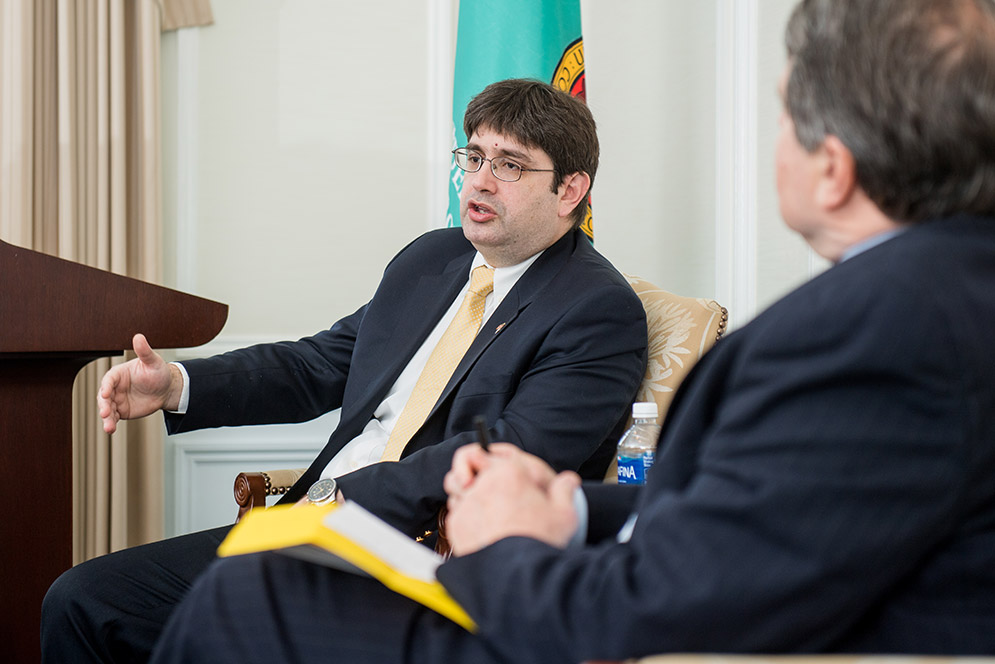Time to Lift the Embargo, Cuban Diplomat Tells Pardee Audience
Out of date, out of step with current global trade, Miguel Fraga says

Even a majority of Cuban-Americans want the trade embargo on Cuba lifted, Miguel Fraga, first secretary of the Cuban Embassy in the United States, told an audience at the Pardee School of Global Studies. Photo by Cydney Scott
The US embargo on Cuba makes no sense and must come to an end, Miguel Fraga, first secretary of the Cuban Embassy in the United States told an audience of students, faculty, and guests last Thursday at the Pardee School of Global Studies.
“We are in the best moment in the last 50 years between Cuba and the United States,” Fraga said. “We don’t want to wait another 50 years.”
The secretary’s appearance was part of Pardee’s Beyond the Headlines lecture series, and Fraga said he liked the title. “If you believe the media, Cuba is the worst country in the world,” he said. “But if you ask the World Bank—this is not Cuban propaganda—the life expectancy is 79 years, and we have 6.7 doctors per every 1,000 people in our country. We spend 12.8 percent of our GDP on education and 8 percent on health.”
Fraga was quick to acknowledge that Cuba “is not a perfect country, but we are proud of many things. All we want is normal relations, with goodwill and respect. Why can we not have normal relations? Because we are communist? You have relations with China, with Vietnam. How many soldiers have you lost in Vietnam? And how many in Cuba?”
Over the last few years, under President Obama, Fraga noted, many improvements were made to the relationship between the two countries, including the restoration of diplomatic relations in 2015 and the easing of travel restrictions. But the embargo imposed after Cuba’s 1959 revolution remains in place, and its future under President Trump is unclear.
Fraga cited recent polls by the Pew Research Center and other pollsters indicating that the majority of Americans, even Cuban-Americans, now support better relations and lifting the embargo.
He attributed the change in attitude to the rise of a new generation that is not held back by the arguments of a half-century ago, when the late Fidel Castro and his brother Raul, now the president, were Cold War targets of the United States.
“We are in the best moment in the last 50 years between Cuba and the United States. We don’t want to wait another 50 years.” –Miguel Fraga
“In the beginning, after the revolution, people said this is only going to be for six months,” Fraga said. “Then they said the problem is the Soviet Union. After the Soviet Union disappeared in 1991 and we lost 80 percent of our trade, they said the problem was Fidel. Now the people say the problem is Raul. I don’t know what they are going to say next, because Raul says he is not going to be part of the government after next year.”
So why does he think the embargo—called a blockade by Cubans—remains? His personal opinion, he said, is that the United States is dealing with many problems, “and only our enemies—only the people that don’t want good relations—make Cuba a priority.”
Fraga preempted questions about human rights and freedom of speech in Cuba by bringing up the issue himself, noting that the United States trades with plenty of other one-party-system countries. “Is Cuba a bad society?” he said. “It is not perfect, and we are doing a lot of changes in Cuba.”
Some 10 percent of Cubans are now employed in the private sector, a major shift, he noted, adding that the government is not censoring content on the internet, whose access is limited largely by lack of resources and equipment.
He said that students at a Cuban law school recently got a computer lab with 24-hour internet. “What they did there? No research,” he said. “They were trying to see what happened with baseball here in the United States, soccer in Spain, what movie do you have here? So, we are not afraid of the internet. Right now, a quarter million Cubans connect daily to Wi-Fi. And they do the same that you do here: Twitter, Facebook, whatever.”
Fraga himself tweets. And Cuba has recently signed an agreement with Google to try to improve access, he said.
Paul Webster Hare, a Pardee School senior lecturer in international relations and the British ambassador to Cuba from 2001 to 2004, asked Fraga why Cuban officials took so long to approve even those foreign investments that are allowed by law.
“I really believe the problem is that we need to be sure something is for the future, and in the majority of cases, we don’t have that feeling, because the embargo is a reality,” Fraga said. For example, he noted that it is legal now for a US bank to open an office in Cuba, but none has done so. Why? Because nobody knows what the relationship is going to be in six months, he said.
“I always remember the speech of President Kennedy, when he talked about opportunities between the Soviet Union and the United States,” Fraga said. “He said, ‘Probably we cannot solve all our differences now, but we can work together.’ And he was thinking about the Soviet Union. Why not with Cuba?”

Comments & Discussion
Boston University moderates comments to facilitate an informed, substantive, civil conversation. Abusive, profane, self-promotional, misleading, incoherent or off-topic comments will be rejected. Moderators are staffed during regular business hours (EST) and can only accept comments written in English. Statistics or facts must include a citation or a link to the citation.